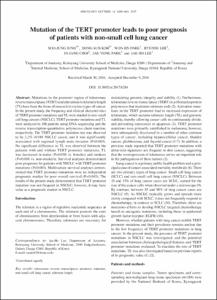Mutation of the TERT promoter leads to poor prognosis of patients with non-small cell lung cancer
- Keimyung Author(s)
- Choi, In Jang; Lee, Jae Ho; Lee, Hyun Su
- Department
- Dept. of Anatomy (해부학)
- Journal Title
- Oncology Letters
- Issued Date
- 2017
- Volume
- 14
- Issue
- 2
- Keyword
- non-small cell lung cancer; telomerase reverse transcriptase promoter mutation; telomere length
- Abstract
- Mutations in the promoter region of telomerase reverse transcriptase (TERT) and alterations in telomere length (TL) have been the focus of research in various types of cancer. In the present study, the frequency and clinical characteristics of TERT promoter mutations and TL were studied in non-small cell lung cancers (NSCLC). TERT promoter mutations and TL were analyzed in 188 patients using DNA sequencing and the reverse transcription-quantitative polymerase chain reaction, respectively. The TERT promoter mutation rate was observed to be 2.2% (4/188 NSCLC cases), and it was significantly associated with regional lymph node invasion (P<0.001). No significant difference in TL was observed between the patients with and without TERT promoter mutations. TL was decreased in males (P=0.058 vs. females) and smokers (P=0.008 vs. non-smokers). Survival analyses demonstrated poor prognoses for patients with NSCLC with TERT promoter mutations (P<0.001). Multivariate survival analyses demonstrated that TERT promoter mutations were an independent prognostic marker for poor overall survival (P=0.045). The results of the present study demonstrated that TERT promoter mutation was not frequent in NSCLC; however, it may have value as a prognostic marker in NSCLC.
- Publisher
- School of Medicine (의과대학)
- Citation
- SOO-JUNG JUNG et al. (2017). Mutation of the TERT promoter leads to poor prognosis of patients with non-small cell lung cancer. Oncology Letters, 14(2), 1609–1614. doi: 10.3892/ol.2017.6284
- Type
- Article
- ISSN
- 1792-1074
- Appears in Collections:
- 1. School of Medicine (의과대학) > Dept. of Anatomy (해부학)
- 파일 목록
-
-
Download
 oak-2018-0742.pdf
기타 데이터 / 797.89 kB / Adobe PDF
oak-2018-0742.pdf
기타 데이터 / 797.89 kB / Adobe PDF
-
Items in Repository are protected by copyright, with all rights reserved, unless otherwise indicated.